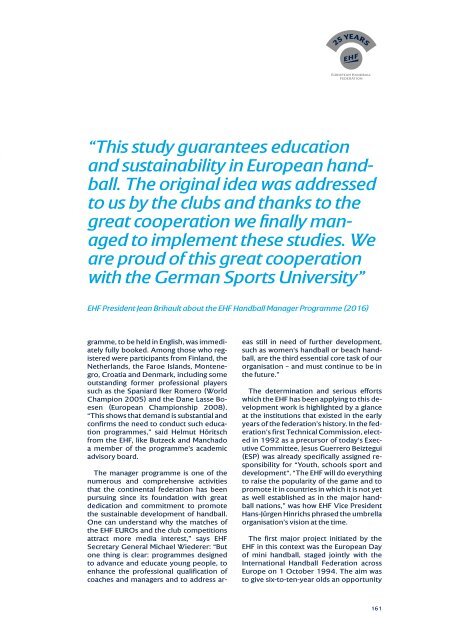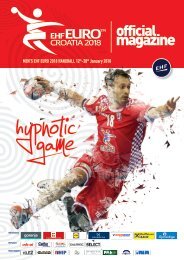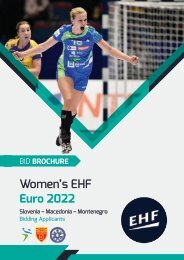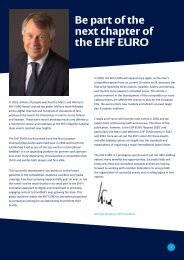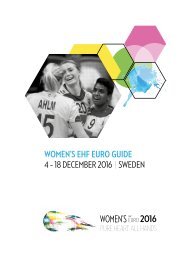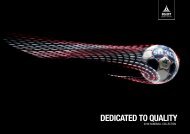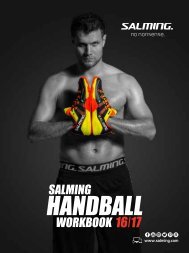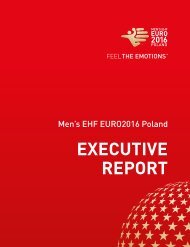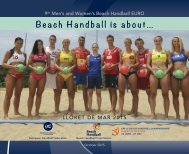ehf_25yers_book_webversion
You also want an ePaper? Increase the reach of your titles
YUMPU automatically turns print PDFs into web optimized ePapers that Google loves.
“This study guarantees education<br />
and sustainability in European handball.<br />
The original idea was addressed<br />
to us by the clubs and thanks to the<br />
great cooperation we finally managed<br />
to implement these studies. We<br />
are proud of this great cooperation<br />
with the German Sports University”<br />
EHF President Jean Brihault about the EHF Handball Manager Programme (2016)<br />
gramme, to be held in English, was immediately<br />
fully <strong>book</strong>ed. Among those who registered<br />
were participants from Finland, the<br />
Netherlands, the Faroe Islands, Montenegro,<br />
Croatia and Denmark, including some<br />
outstanding former professional players<br />
such as the Spaniard Iker Romero (World<br />
Champion 2005) and the Dane Lasse Boesen<br />
(European Championship 2008).<br />
“This shows that demand is substantial and<br />
confirms the need to conduct such education<br />
programmes,” said Helmut Höritsch<br />
from the EHF, like Butzeck and Manchado<br />
a member of the programme’s academic<br />
advisory board.<br />
The manager programme is one of the<br />
numerous and comprehensive activities<br />
that the continental federation has been<br />
pursuing since its foundation with great<br />
dedication and commitment to promote<br />
the sustainable development of handball.<br />
One can understand why the matches of<br />
the EHF EUROs and the club competitions<br />
attract more media interest,” says EHF<br />
Secretary General Michael Wiederer: “But<br />
one thing is clear: programmes designed<br />
to advance and educate young people, to<br />
enhance the professional qualification of<br />
coaches and managers and to address areas<br />
still in need of further development,<br />
such as women‘s handball or beach handball,<br />
are the third essential core task of our<br />
organisation – and must continue to be in<br />
the future.”<br />
The determination and serious efforts<br />
which the EHF has been applying to this development<br />
work is highlighted by a glance<br />
at the institutions that existed in the early<br />
years of the federation’s history. In the federation’s<br />
first Technical Commission, elected<br />
in 1992 as a precursor of today‘s Executive<br />
Committee, Jesus Guerrero Beiztegui<br />
(ESP) was already specifically assigned responsibility<br />
for “Youth, schools sport and<br />
development“. “The EHF will do everything<br />
to raise the popularity of the game and to<br />
promote it in countries in which it is not yet<br />
as well established as in the major handball<br />
nations,” was how EHF Vice President<br />
Hans-Jürgen Hinrichs phrased the umbrella<br />
organisation’s vision at the time.<br />
The first major project initiated by the<br />
EHF in this context was the European Day<br />
of mini handball, staged jointly with the<br />
International Handball Federation across<br />
Europe on 1 October 1994. The aim was<br />
to give six-to-ten-year olds an opportunity<br />
161


